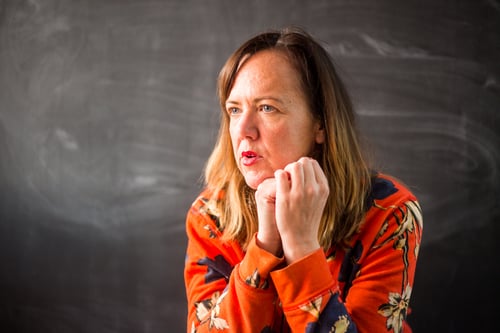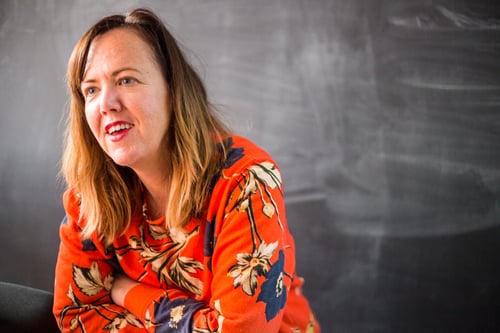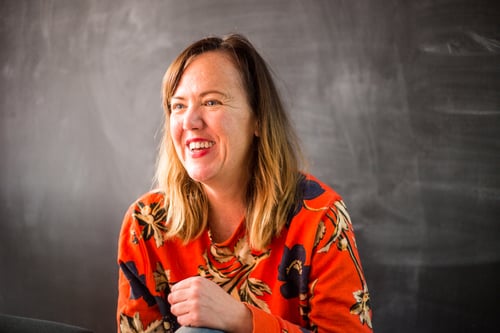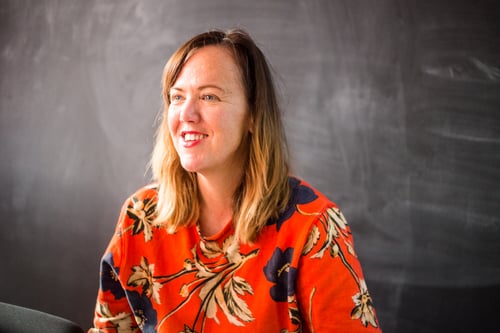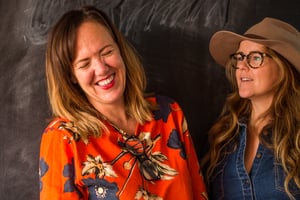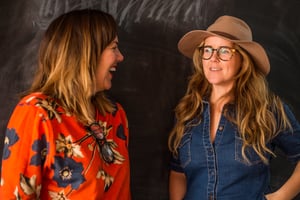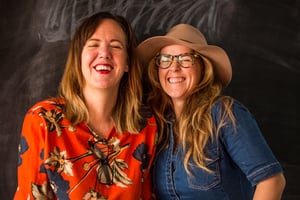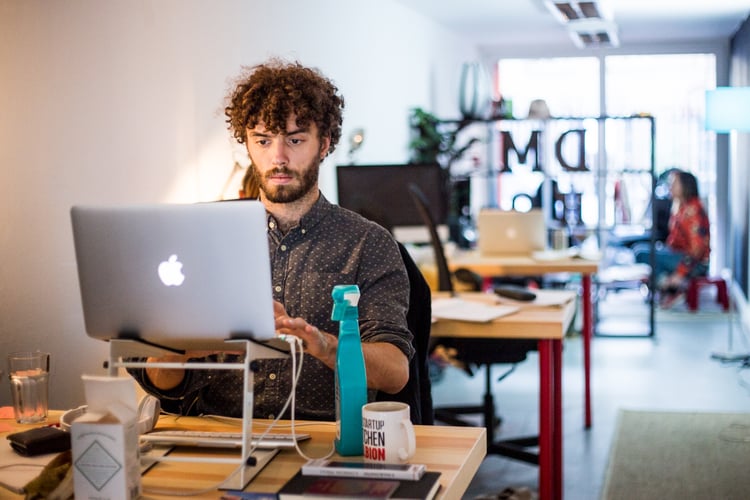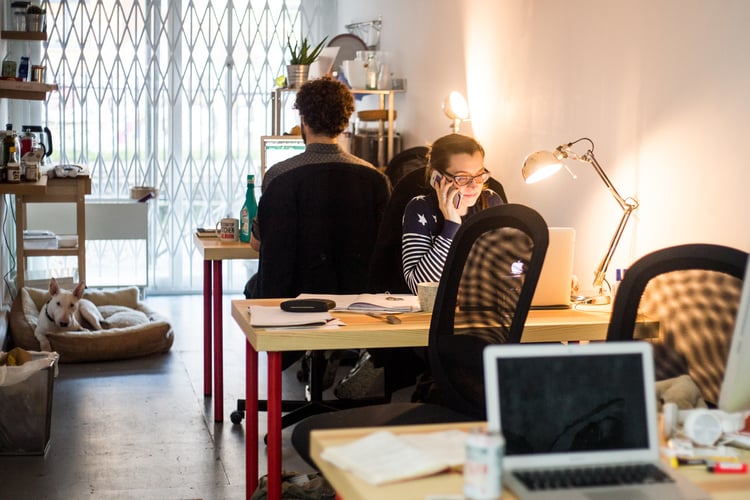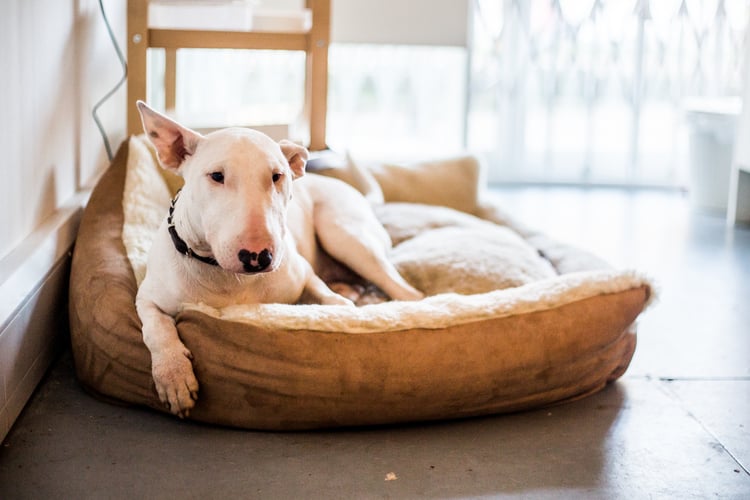Nikki and Kathryn of Digital Mums
At the end of 2015, Nikki Cochrane (left) was nominated as one of the ‘One’s to Watch’ by the BBC’s Make It Digital initiative, so we were pretty chuffed to have already had the chance to chat with the co-founder and director of social enterprise, Digital Mums, in an uplifting, candid interview.
Along with long-term friend Kathryn Tyler, they're the brains behind a steadily growing organisation that trains mothers who seek flexible part-time work, to become social networking managers. With online support, their 'students' are matched with prospective employers - who enthusiastically take up the opportunity of a two-way flexible working relationship.
Changing the digital landscape from an upcycled shipping container on the banks of Regents Canal, we settled down with Nikki to learn more about the duo’s out-of-the-box ambitions.
On growing up
“I left school without any qualifications! It wasn't that I wasn't academic, was just a bit curious about the world, so in my 20s I ended up going off travelling,” explains Nikki, who lived in LA and Tokyo. “Eventually I was back here and kind of 30 years old and it was like, ‘What am I going to do?’” An emotionally intelligent lateral thinker, she ended up doing a psychology degree at Open University, graduating around 5 years ago at age 37; “It was a real journey of confidence for me - I didn't tell anyone I was doing a degree, I just said I was doing a course, because I thought what happens if it starts getting really hard?”
“I got all the qualifications!” Kathryn makes a cameo appearance (with the office dog in tow) before she has to run off to yoga, which coincidentally is how the pair met. “I grew up in a mining valley in Wales where no one had jobs, that was the 80s. I was just weirdly clever; my mum was a bit like ‘Where has she come from?’ As soon as my last A-Level exam finished, I left Wales because I was like ‘I don’t belong here’ – I always used to think I was adopted! So I went to Birmingham University where I did molecular genetics.” She didn't enjoy it, so, hustled a bit and found her real passion; “I lied about having been a PA for 2 years to get an admin job in a charity and once I got that, I started to do some press stuff for them and that's when I moved into comms, where I was like ‘Oh yeah - this makes more sense to me - chatting and understanding people.’”
When they met
“Nikki and I met at a spa retreat actually in Thailand, where we were doing yoga and fasting,” says Kathryn who had gone out there with some mates. “It sounds a bit posh when you say spa but it was quite basic with little huts and you go there for a week to just get into the zone,” Nikki explains, who was also with a friend when they happened upon the chance encounter; “I was there with Geraldine doing some yoga and suddenly there was this noise outside from these girls ruining the Zen. They were these East End type of girls… we ended up becoming best of friends by the end of the day, talking about food because we weren’t eating, bonding over how hungry we were!” That was about a decade ago but it’s still a defining moment for them both, and they even ended up going to the spa in Thailand again.
The prequel to Digital Mums
“I was working at M&C Saatchi doing social media and Kathryn was at the Innovation Unit as the head of digital. We were both really passionate about community and wanted to do good but also do business, work flexibly and eventually be free to keep our very own dog - so Hackney Social was born. It was this little PR agency supporting local businesses with their digital marketing.”
“We were both still at full-time jobs but we took on a couple local pro-bono clients just to test things out - we're all about prototyping. After 3 months, we understood they needed help because they didn't know what they were doing, they didn't have the time and they didn’t have a huge budget. What we also realised was there was a limit of what Kathryn and I could do, just the two of us - they needed someone part-time, they needed someone flexible, they didn't need someone in a physical premises and they did need someone they could trust knew what they were doing. The solution was that we needed an army of social media managers.”
Digital Mums is born
“Then we started to think about what it takes to be a social media manager: you have to be a really good listener, you have to show empathy and you need to be able to stay calm in a crisis. And we had this light bulb moment – mums!”
The equation just made sense to the groundbreaking duo; mothers often want work but there are not enough part-time opportunities out there, social media is a job they can do from their phone on the move, or with the kids running about at home. But that’s not all, Nikki continues with the criteria; “They also need to be able to understand why a client is on social media in the first place, to get what the overarching business objectives are, which ultimately lead into what your marketing strategy is.” As a result Digital Mums have a strict application process, taking in rounds of students every month that include women who’ve worked at the BBC, The Sunday Times, and Grazia. “They're pretty awesome!”
The business model and the benefits for businesses
People are proactively requesting Digital Mums for graduates due to the calibre of the demographic. Kathryn and Nikki have realised that they’re actually creating jobs where opportunity didn’t exist, or hadn’t been realised before; “one of our students wrote a blog about how bigger companies are grasping that there's a third way. Either you're a stay at home mum, or you are at work, or actually you’re a Digital Mum – the third way. I really love that.”
“You don’t have to sell it; they’re like - ‘Well that makes sense.’ - Quite frankly, the businesses that get to work with them would never have access to talent like this usually. I think some of them can't believe their luck.”
Naturally, that means the social enterprise is all about protecting their most important asset: the mums. “We don’t want the mums to get paid 8 to 10 pounds an hour; we want them to get paid 12 to 15 so we moved away from our Agency model and on to a recruitment model where Digital Mums charges a small one-off payment from clients for an introduction to graduates from our Strategic Social Media Programme” This solution has been pretty successful; completion rate of our programmes is at a high of 95%, and of the 100 students that have graduated, the 67 who’ve wanted work, have got it.
The most important but least spoken about bit
“The training is a massive part of our business that we never really talk about. It isn’t just a case of getting a business to work with and going ‘Good luck with that’. Delivered entirely remotely, the intensive 6-month programme involves the students cutting their teeth with a small business and building their confidence over while working on assignments that are real outputs for that business; “ultimately we teach a process emulating the client experience.” Along the way, mums consult and feedback with other students in the same training cohorts, along with a learning how to become a freelancer.
Necessity, the mother of invention.
What Digital Mum’s has done for strapped mothers is pretty beautiful, and some of them have shared the personal impact made upon them with Nikki; “There was a lady who had a market research background but she’d been out of work for a while when she joined in September 2014. She sent me an email that could make you cry, it was along the lines of: ‘I've just been doing some reflection, it's been 12 months since I first saw you pop up onto my Facebook feed and I made the decision to sign up to Digital Mums - at the time I was racked with money worries, really low self esteem and now I have two clients and one of the clients is so pleased with my work he's offered me 2 days consultancy on my rate, on my terms, and it's literally transformed my life.’”
There’s no denying the strong feminine bond that underlines the organisation. Students work in peer groups of 6 and each is named after a famous woman or mother such as Michelle Obama, dubbed the Obama Belles on Twitter. A little hashtag search uncovers a sense of community between the Digital Mums.. Kathryn’s father died while she was in her early 20s and Nikki's own father passed away when she was just 4, so both were raised by hard working single mothers. “I didn't feel like I missed out on anything but I guess when I look back I was quite poor."
The social enterprise is putting 10% of their profits towards a the Digital Mums Foundation, a bursary fund for low-income mums; “That's really important to us. It means applicants who are on benefits can go on to either programme for free.”
At home in Containerville
Between the touches of personality in the decor and office dog snoozing in the corner, the Digital Mum's HQ immediately feels like a much loved abode, “We spend more time in this office than we do at home!”. Nikki explains how important it was for them to find the right space, ”Previous to moving into Containerville, we didn't have our own office. Getting our first space right was really important for us and Containerville was a great fit for us. The fact that it's a creative hub, with 20 other local businesses in a range of different sectors - we really value being part of a wider community of local businesses and entrepreneurs all striving for success. It's local to the majority of our team, which made it an obvious choice too.”
Have the entrepreneurial pair peaked?
Without having to seek out the spotlight, media outlets such as The Telegraph, Huffington Post, The Guardian, The Observer, and surprisingly first to the post - The Daily Mail - have all featured Digital Mums. Do they feel like they’ve made it? “OMG! No Way. It's really funny you say that, we've just been through an investment raise and we've pretty much got it, so we are due to receive £285,000 - that's just when the work starts. Now we've got to hire people, we've got growth targets to keep. I'm excited but also it’s real - these people are actually giving us their money, proper money! So it's going to constantly keep evolving and if we ever think it's finished then we've failed. There's always room for improvement.”


